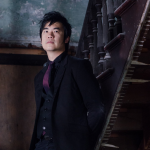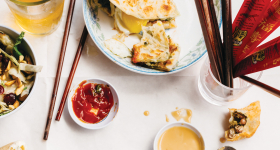Chapter 4: Yo Ho
LIFE AS A TOURING MUSICIAN, I imagine, is a lot like being on the crew of a pirate ship.
Casual observers might see us as rogues who are trying to accrue fortune and fame in every town where we dock, but the reality is that most of the hours are spent drifting in transit, hanging on while we fight off scurvy (seriously, punk rockers need to eat some more fruit).
Like any other kind of organization, leading a band means that you are held responsible for the failures, but not necessarily lauded for the successes. The default assumption is that the manager needs to do their job: they get things done, that’s the job. There shouldn’t be any surprises, the manager just keep things going (even if you aren’t getting paid extra for the work). In that sense, the true reward for doing good work is the ability to do more work. In another, being the ship’s captain means you’re no different than the garbage man. People don’t thank the garbage man, they don’t tip them when there’s more rubbish to pick up than usual. No one thinks about the person who picks up the garbage—unless there’s a problem with the garbage.
Most of the time, this is perfectly fine for me. I actually enjoy solving problems. This is probably why I’ve always been drawn to nonprofits: one is always engaged in working on problems, especially with the larger problems with the world. With a touring band, this means I’m responsible for keeping the ship afloat: the vehicle is running, the shows are happening, the conflicting needs of the members are being addressed. The challenge is that when you’re also a band member, the lines get blurred when you’re also seen as a friend, a boss, and an “equal” partner to the organization that you started to begin with. People don’t want to listen to someone simply because they have the title (but they are more than happy to blame you when things aren’t going well).
Don’t get me wrong though, being on tour is fun. It isn’t all work, broken down vehicles, and disagreements. There have been some unimaginable moments of levity as well. We’d have prank wars on Slants’ tours (my team had the biggest victory when we froze our opponents’ socks and underwear to the balcony during one of the coldest winters in Boston), we’d eat the best regional foods from each tour destination (you can’t beat a New York slice or barbecue in Texas), and we’d meet some wonderful people. If it weren’t for the musician lifestyle, I probably would have never seen most of North America, Europe, or Asia.
Touring in a band also teaches you a diverse set of skills that you need to survive, like learning how to change out tires without the proper tools or figuring out just how many meals you can create using the hot water tab at truck station stops. With the Slants, I was developing a new kind of street wisdom to make sure everything would run smoothly. For example, when we played punk rock dives in questionable neighborhoods, I would affix a mannequin head with a hat to a stuffed sleeping bag in the passenger seat of our van so people would think someone was on guard duty. It was the scarecrow of tour vehicles, creating a deterrent, like learning how to park a bus or van and trailer against a wall so vulnerabilities would be minimized. I also started memorizing the country by drive times. Vegas? That’s about four hours from L.A. unless you’re hauling a trailer, then it’s closer to six. Austin? That’s about thirty-four hours from Portland. I learned more about geography from punk rock than public school.
I never took shop or automobile classes in school but touring gave me a crash course in dealing with all kinds of mechanical problems. These problems were so frequent, it was like a strange bond developed with our tour vehicles that needed constant attention. One time, the suspension on our bus was so loose and the roads in Louisiana so shoddy, that it felt less like we were driving and more like we were sailing an old fishing boat down the highway. I remember looking out our large windows like they were portholes and watching alligators warm their scaly bodies on the banks of a swamp. I always had my fingers crossed, hoping we wouldn’t be breaking down beside them.
Frequent travel by air develops a similar aptitude for resourcefulness, like learning how to hop on a plane with additional bags for free (you bring an extra carry on to the gate, then volunteer when they begin asking people to gate check their bags). Most of the time, airline staff are not happy to see us. You see their bodies stiffen when they see a pack of us walking up to the gate with music equipment in hand. This flight is sold out, bitch. Good luck finding overhead space for that guitar.
Before I had TSA PreCheck, I was almost always stopped at security. Large cases filled with wires always made them a bit anxious. At certain airports (like Tallahassee), I was always flagged for a “random security check” whether I was carrying music gear or not. One time, they justified it by saying it was because the banana in my bag looked suspicious. Sure. But a little kindness goes a long way. Like us, flight attendants travel for a living and they just want a little respect or appreciation.
On a flight to Taipei, I thanked the crew for being patient with us while dealing with all of our music equipment. The attendant learned I was in the Slants and that it was also my birthday, so they brought me a large bottle of champagne and a box of chocolates as a gift. “Happy birthday from the crew,” they said, as they also handed me their WeChat number. “Be sure to send me details about your show in Taipei, I’d love to go.” In retrospect, I wasn’t sure if they were hitting on me or just being friendly, but either way, it was a really cool surprise.
One thing I never expected to pick up from touring was my social justice activism—and I really dove into that world, of all places, at an anime convention. In 2008, I was contacting every anime convention in the country trying to book the Slants. I started trading emails with someone named Solikha “Sonnie” Wright. Eventually, we hopped on a call to talk about the Slants, and she strongly urged me to play the Middle Tennessee Anime Convention (MTAC in Nashville, TN) even though they were over budget, meaning we’d have to pay for our own expenses. The idea was that fans were so enthusiastic there that the merchandise sold would easily cover our flights. With some reluctance, I decided to take that chance.
When we landed in Nashville, we learned that there were six other music acts on the bill. Most anime conventions only had one or two. Sonnie loved music and stacked live bands night after night. Being in Music City, it seemed only appropriate. Sonnie was also an artist who ran a company called Stubby Chubby, and her booth was stationed next to us. She was a Cambodian-Japanese woman who had a natural, confident aura around her, possibly developed from her former life as a dominatrix. While she sold hand sewn sushi pillows, she also had an assortment of decorated paddles and collars that convention kids loved. There, we met her team, which included her husband Jeremy, and their friends Yad and Lizzie. Since they were also our liaisons for the event, we spent about sixteen hours a day with them.
On our first day, Sonnie asked a couple of us to join a panel she was running. She told me that we should get as much face time as possible so that we could get more attendees familiar with us and excited about the show.
“It’s called in Asians in America,” she told us.
“Cool,” I said. “What’s it about?”
“Asians . . . in America.”
“Ok . . .”
“Trust me, it’ll get interesting.”
I grabbed two of my band mates, Aron and Jen. We walked down the hallway and joined some of the other Asian American guests who were at the convention—most of them were visual artists who illustrated, we were the only musicians. The room itself was very intimate: a small hotel conference room with about thirty chairs lined up in rows.
When the doors opened, every seat was quickly filled. Attendees started sitting on the floor in the aisles, standing up in the back, and watching from the doorway. Apparently, that can happen when you grab all of the Asian guests and put them in one room at an anime convention.
Sonnie stood and addressed the room. “Welcome to Asians in America. This is a free-form panel, so anything goes. Have you ever wondered something about Asians but were too afraid to ask or didn’t know how to search for it? Now you can ask whatever you want. Food, penis size, whatever. Nothing is off the table.”
I was a bit nervous. What did I get myself into this time?
The questions started trickling in . . . then it was like the dam broke loose, and we were flooded with all kinds of ridiculous questions:
“Do Asian women have a sideways vaginas?”
“Do Asians really drive that bad?”
“Do you eat food like hamburgers and pizza with chopsticks?
I couldn’t believe it. Apparently, some of the people there had never met an Asian person before. They were plainly asking questions based on racial stereotypes. At first, we were mortified. But then we clapped back. Our answers got snarky, we didn’t pull punches and weren’t afraid to flip stereotypes to show the absurdity of the presumptions made about us. When the inevitable question about the Asian phallus came up, one of the other guests stood up and began unzipping his pants while saying, “How about I show you?”
A month after MTAC, we flew to Chicago for one of the largest conventions in the U.S.: Anime Central (ACEN). Sonnie was talking up the green room parties at ACEN, saying convention directors from across the country would be there. So with a box of CDs and my publicist, Alex, we made our way to the Windy City.
When we got there, the Stubby Chubby team was there to greet us: Sonnie, Jeremy, Lizzie, and Yad. Lizzie was even sporting a Slants’ t-shirt and track jacket, which she picked up from our band when we were in Nashville. I didn’t know it then, but I’d end up seeing her in Huntsville, AL the next month as well—and there, we’d make an unexpected and strong connection that would lead to a long-distance relationship.
Throughout the weekend, I gave away mediocre art that I drew on the back of flyers while trying to sell CDs from a shared space at Sonnie’s booth. I also tried making the most of my time at the convention by leading several panels on Asian American identity and the music industry. Most of the time though, I was goofing off with Lizzie at the Stubby Chubby station, who was amused that my artwork could resemble the talent of an eleven year old with impressive accuracy. She had the grace of a ballet dancer and a sharp wit that would rival Oscar Wilde. We talked about our mutual love of books, Jackie Chan films, and delicious food.
On the second day of the event, I was looking through the program book to see what other events they had. I stared, almost not believing what I was looking at and passed the booklet over to Sonnie.
“How to Pick up an Asian Guy or Girl. It sounds like a workshop on picking the right breed of dog.”
“I know!”
“This is really racist.”
“Yeah, I know.”
“We should totally go.”
“I KNOW!”
A couple of hours later, we found ourselves in a huge convention center ballroom that easily had four hundred people seated inside. It was packed. We took seats near the front and waited. Soon, it was past the hour, but no one was up front or leading the panel. We asked the room moderator what was happening, and they said that the panelists didn’t show up. So we walked to the front of the room, picked up the mic, and took over the panel.
“Welcome to How to Pick Up an Asian Guy or Girl! How many of you actually think the name of this panel is offensive?”
The only hands being raised were by Asian American attendees, many of whom showed up for the same reason we did: to find out who would put on such a workshop. Within a few minutes, we turned the panel into an Asians in America Q&A session, taking down stereotypes and fighting racism one answer at a time.
Despite the cirque-like atmosphere and the occasional eye rolling in these panels, I had a revelation: we were talking about important issues of racism and stereotypes about Asian Americans (at an anime convention of all places!). I couldn’t remember having that honest of a conversation with white strangers, ever. People wanted to connect, they just didn’t know how. By disarming them, using some light humor, and allowing brutal honesty, we were able to make progress by holding conversations they were afraid to have anywhere else. So I took the show on the road: I started offering the same panel, as well as spin-off versions of it, at nearly every event since then. All across the country, we started holding anti-racism workshops, but it all began in a small room in Nashville, TN.
"Slanted" is available for purchase now, and an Off-Broadway show version of the story will be up at The Tank NYC, November 13, 2019.










Comments